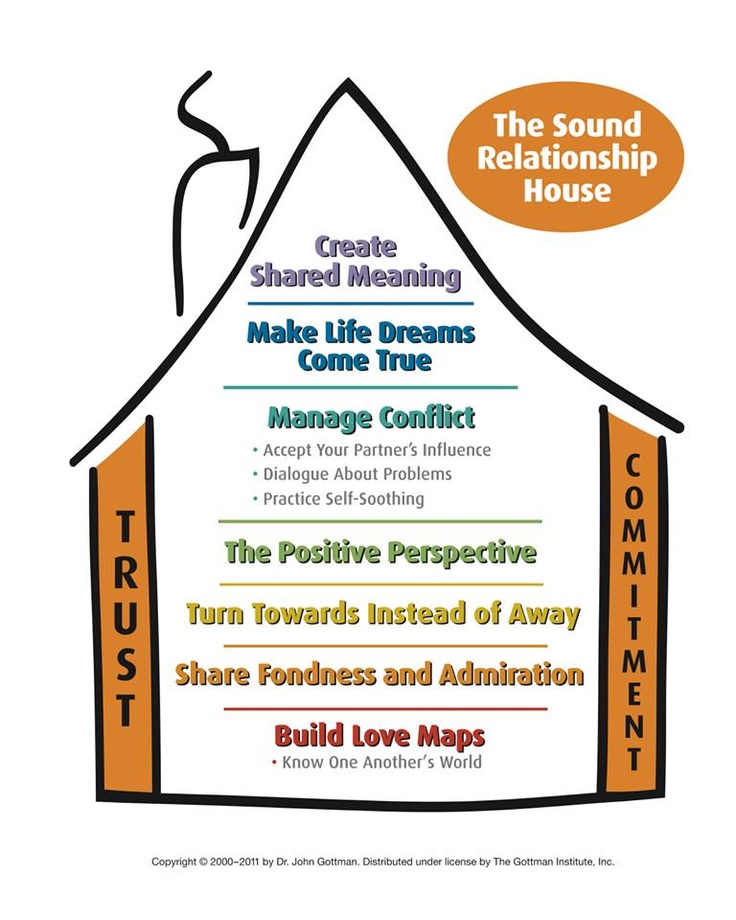Emotion Focused Therapy (EFT) + Gottman Method Couples Counseling
of all marriages that end do so in the first seven years.
%
of new parents experience a precipitous drop in couple satisfaction in the first three years of the baby's life.
%
of conflict in relationships is about unresolvable, perpetual problems.
%
of marriages survive if they attend couples counseling after an affair
Combining the knowledge and wisdom of over forty years of studies and clinical practice, Gottman Method Couples Therapy helps couples break through barriers to achieve greater understanding, connection and intimacy in their relationships.

- If toxic relationship patterns can be identified early and agreed upon, the process of real change can begin.
- A motivated couple can begin to explore their problems from a new perspective and learn new ways to recognize and resolve conflicts as a result of the tools provided by the therapist.
- Partners can begin to build trust and improve communication that may have eroded the quality of their interactions.
- A couples counselor can provide “neutral territory” to help couples agree upon and work through tough issues with support.
- Couples can decide to rebuild their marriage and make a renewed commitment, or clarify the reasons why they need to separate or end the marriage.
The Gottman Institute’s 40+ years of research shows that to make a relationship last, couples must become better friends, learn to manage conflict, and create ways to support each other’s hopes for the future. Drs. John and Julie Gottman have shown how couples can accomplish this by paying attention to what they call the Sound Relationship House, or the nine components of healthy relationships.
- Build Love Maps:
How well do you know your partner’s inner psychological world, his or her history, worries, stresses, joys, and hopes? - Share Fondness and Admiration:
The antidote for contempt, this level focuses on the amount of affection and respect within a relationship. (To strengthen fondness and admiration, express appreciation and respect.) - Turn Towards:
State your needs, be aware of bids for connection and respond to (turn towards) them. The small moments of everyday life are actually the building blocks of relationship. - The Positive Perspective:
The presence of a positive approach to problem-solving and the success of repair attempts. - Manage Conflict:
We say “manage” conflict rather than “resolve” conflict, because relationship conflict is natural and has functional, positive aspects. Understand that there is a critical difference in handling perpetual problems and solvable problems. - Make Life Dreams Come True:
Create an atmosphere that encourages each person to talk honestly about his or her hopes, values, convictions and aspirations. - Create Shared Meaning:
Understand important visions, narratives, myths, and metaphors about your relationship. - Trust:
This is the state that occurs when a person knows that his or her partner acts and thinks to maximize that person’s best interests and benefits, not just the partner’s own interests and benefits. In other words, this means, “my partner has my back and is there for me.” - Commitment:
This means believing (and acting on the belief) that your relationship with this person is completely your lifelong journey, for better or for worse (meaning that if it gets worse you will both work to improve it). It implies cherishing your partner’s positive qualities and nurturing gratitude by comparing the partner favorably with real or imagined others, rather than trashing the partner by magnifying negative qualities, and nurturing resentment by comparing unfavorably with real or imagined others.
John Gottman coined the phrase turning toward one another to describe how couples can learn to react in a positive way to one another’s bids for attention rather than “turning away” – which generally involves ignoring a partner’s bid, or acting preoccupied. He writes, “turning toward one another is a kind of secret weapon against elements such as contempt, criticism, defensiveness, and stonewalling – factors that can destroy any relationship.”
How can marriage counseling help couples?
- If toxic relationship patterns can be identified early and agreed upon, the process of real change can begin.
- A motivated couple can begin to explore their problems from a new perspective and learn new ways to recognize and resolve conflicts as a result of the tools provided by the therapist.
- Partners can begin to build trust and improve communication that may have eroded the quality of their interactions.
- A couples counselor can provide “neutral territory” to help couples agree upon and work through tough issues with support.
- Couples can decide to rebuild their marriage and make a renewed commitment, or clarify the reasons why they need to separate or end the marriage.
7 tips to help deal with differences between you and your partner:
- Create a relaxed atmosphere and spend time with your partner on a regular basis so you can communicate about your desires and objectives.
- Don’t give up personal goals and the things you love to do such as hobbies or interests. This will only breed resentment.
- Support one another’s passions. Accept that you won’t always share the same interests. Respect your partner’s need for space if they want to go on a vacation without you, etc.
- Learn to resolve conflicts skillfully. Don’t put aside resentments that can destroy a relationship. Couples who try to avoid conflict are at risk of developing stagnant relationships, which can put them at high risk for divorce.
- Establish an open-ended dialogue. Listen to your partner’s requests and ask for clarification on points that are unclear. Avoid threats and saying things you’ll regret later.
- Avoid the “blame game.” Take responsibility for your part in the problems and accept that all human beings are flawed in some way. The next time you feel upset with your partner, check out what’s going on inside yourself and pause and reflect before you place the blame on them.
- Be realistic about a time-line for change. It takes more than a few sessions to shed light on the dynamics and to begin the process of change.


